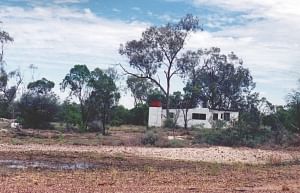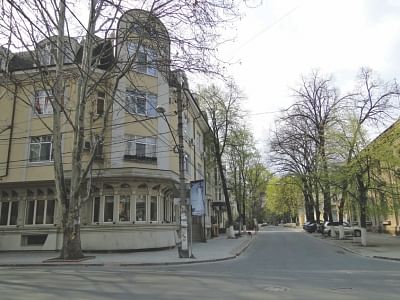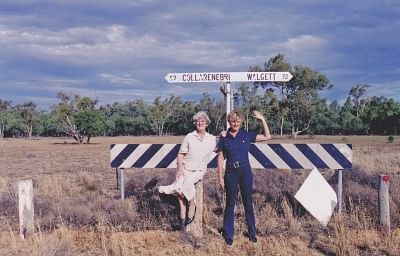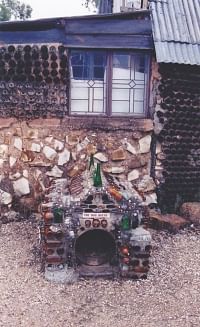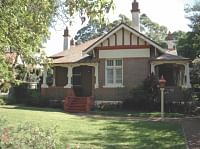| Home - Back Issues - The Team - Contact Us |
 |
| Volume 12 |Issue 03| January 18, 2013 | |
|
|
Reflections
The Min Min Andrew Eagle I He's never seen the Min Min, but his Cousin Mandy has. It was after he got his first car that the country around Coonabarabran opened up, when the frustration of having travelled six hours from Sydney only to reach the beginning of the real outback was overcome. He had his cousin and a green Mazda as willing partners and there were trips, hundreds of kilometres in a day. Over a latte at the Jolly Cauli café they planned; together they drew big circles in the sand. Mandy would be the model of a farmer's daughter had her father been a farmer: there's nothing to suggest she's not a country child; and true to that she's a storyteller. In Coonabarabran stories have their own life. To question factuality is an activity without relevance. City people don't always understand it's like trying to count the bulky raindrops as they hit the tin roof during an afternoon storm. There was only ever to listen and enjoy, what he did when Mandy told of her Min Min encounter.
Nonetheless he has wondered what the secret of her storytelling is. Perhaps it's her face, understated in excitement or surprise; or it's her wheat field accent with its elongated and contorted vowels that makes the dramatic sound as obvious as sitting on a garden rock with a cup of tea. The cicadas are loudly chirping. However she does it, Mandy can make wild statements sound as indisputable as reading a shopping list. But he might not be telling it right. It's best that she should do it. They made it to the unlikely Macquarie Marshes on one sand circle. It's a wetland at a river junction in otherwise dry country. There'd been an eagle, as a human a third as high, sitting in the sunburnt reed lands along the roadside. Eagles can't take off immediately, Mandy said. The kings of the sky need a run up to take flight. A few yards behind it was a fox, flat against the ground in that stalking posture, inching forwards. What would've been the result he couldn't say because the dust-kicking rumble of the car scared them. The eagle took a few ungainly steps and started to unfold its enormous wings. The fox tailed it.
The sky grows larger beyond Coonamble. It's blue and weighty when there's no rain, meaning most of the time. The sky pulled them further and by lunch they reached the town of Carinda with its population of two hundred. Carinda has one shop, a post office cum grocery store cum café. There were pigeon holes on one wall allocated to each household. Who could be bothered delivering mail when the locals have legs and can walk a few hundred metres to collect it? To the side of the grocery shelves was a single plastic table: the café. The cousins asked for a menu. But who could be bothered writing a menu when people can open their mouths and speak? 'What do you want?' In that country where a flat white is a coffee with milk, they might've settled for a corned beef sandwich. Turning back for Coonabarabran they came across the unlikely event of rain. It was with city trepidation he steered along the red-dirt-becoming-red-mud road. It made the car slide. A red-mud road was okay, Mandy said. It was the black-mud that was the nightmare. II
In another dirt circle to the northwest where the land grows rocky and lifeless, they reached Lightning Ridge. Aunt Mary, Mandy's mother, was with them. Lightning Ridge is a mining town, about two thousand people, situated atop the world's largest known deposit of black opals. Miners arrive from afar to spend days underground in backyard mines, hoping to get rich. By late afternoon they were heading home, beyond Collarenebri. They'd chosen a short cut: forty kilometres of dirt before Wee Waa. Well, in that country that doesn't see much rain, by a city dweller's luck it came again, as clouds rolled in and drops plonked against the windscreen. There was a problem. The road was black-dirt. 'We'd better get out of here fast,' Mandy said. 'What if we don't make it?' the city cousin foolishly asked. 'We'll get bogged,' the country cousin replied, 'and it'll be a week until the road dries enough to pull the car out. Don't touch the brake! Keep moving or you'll slide and if we go off the road we'll never get out of it.' The mere forty kilometres suddenly seemed like four hundred as he kept the motion, as rain increased and the road became slippery. Simultaneously there was the groaning and banging of black-dirt and rocks tumbling beneath the car's underbelly. It was the four-wheel drives, Mandy said, that made the deep wheel ruts which made the road all but impassable for sedans. The rain continued. The dirt and rocks kept banging.
'If you do get bogged,' Mandy said, 'whoever comes along might take the tyres, wheels, anything they can salvage. When you eventually come to get it there might only be a wreck.' It would've been impossible to guard the vehicle in that middle-of-nowhere country. He took a risk in a patch of sandier land and stopped the car, cautiously applying the brake. He wanted Mandy to take the wheel. Country hands were needed. It was a deep thankful city relief and a humoured country one that accompanied their emergence at the safety of the tar. They'd made it through! Mandy's husband would never believe how foolish they'd been to attempt that road in that Mazda with rain clouds about. It wasn't the end of trouble though. By the time they'd reached the Newell and the final stretch back into town it was evening: feeding time for kangaroos. By the hundreds they lined the roadside and he'd never seen them so thick. Any one of them could, with a singular hop and splatter of blood, destroy the car's engine. The semi-trailers plying that route don't even slow for the roos and account for most of the road-kill carcases. City people like the roos, Mandy said, and think they're cute. 'They are cute; but on the road they're a menace.' With a limit of one hundred they barely reached sixty and without incident, that too, they made it through! The Golden Fleece roadhouse on the outskirts of town meant a safe return. III About the Min Min, as he remembers, it went thus: Mandy was on her way down from Queensland one night. The road was empty, without another car or a house anywhere, when suddenly a strange light appeared in the sky to the side of the road. It was bright and at low altitude. It seemed close, beyond the eucalypts in the paddock. There is no human factor to make light like that. There were few humans around. It was odd because the light seemed to follow the car, moving parallel to it at some distance. She could see its shine in the gaps between the trees. The light matched the car's speed easily. She stopped the car. The light stopped. She accelerated. The light accelerated. The Min Min light is famous from the Gulf Country south to New South Wales. Many people have seen it and it's mentioned in aboriginal legends. Nobody can explain it. Mandy didn't know what to do without a soul to ask for help. And then, after half an hour, as suddenly as it appeared the Min Min was gone. But he might not be telling it right. It's best that she should do it.
|
||||||||||||||||||||
|

